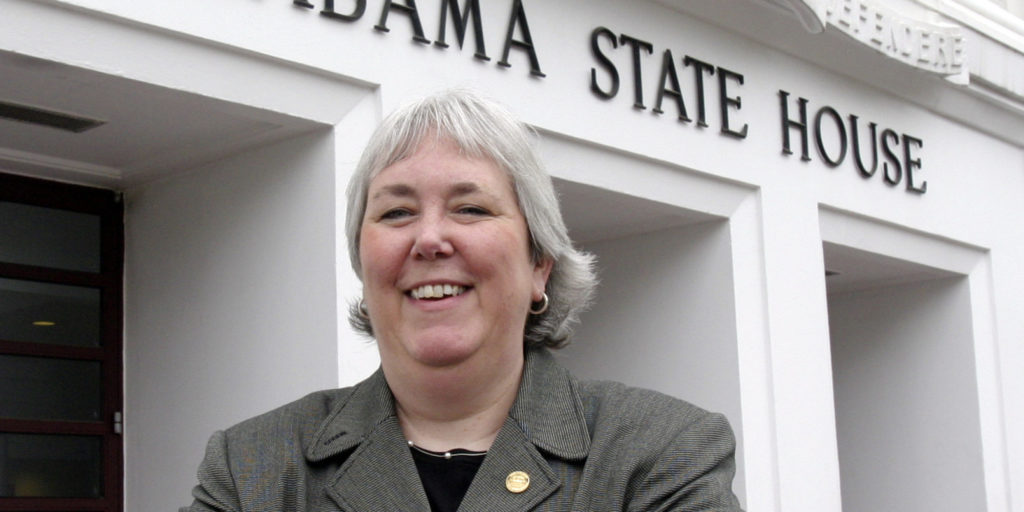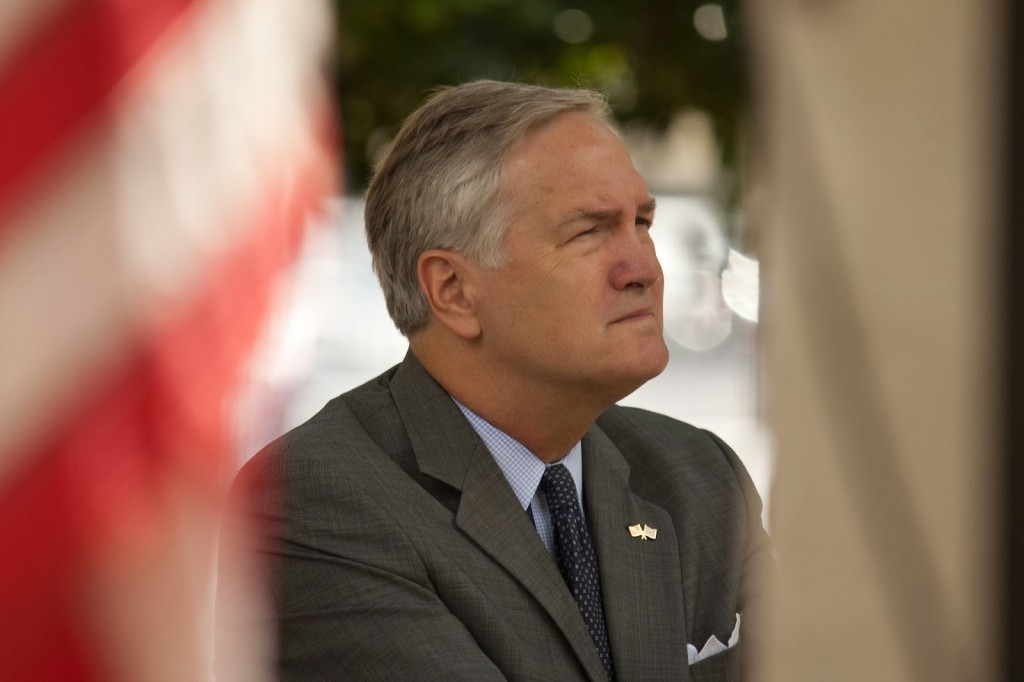Two Alabama bills to lower penalties for marijuana possession up for debate

Two Alabama lawmakers are looking to move marijuana legislation in the state forward. Montgomery-Republican state Sen. Dick Brewbaker and Birmingham-Democrat state Rep. Patricia Todd have both filed bills in the state legislature to be debated by House and Senate Judiciary Committees on Wednesday. Under existing law in the state, any person who knowingly sells, distributes, or brings into the state more than 2.2 pounds of cannabis is considered a trafficker and can be sentenced to a minimum of three years imprisonment and a $25,000 fine. Brewbaker’s SB51, filed earlier in the year, would adjust the minimum amount needed to be convicted of trafficking to 10 pounds. Brewbaker hopes his legislation will keep young people from being convicted of major felonies. “No one is talking about legalizing possession of marijuana, but I haven’t talked to anybody who thinks hanging felonies on college kids is a great idea because that follows them around for the rest of their lives” he told AL.com. Todd’s bill, HB272, seeks to change the amount needed in to be convicted of unlawful possession of marijuana, and the punishment’s inflicted upon those who break the law. As the law stands today, anyone who possesses cannabis for personal use can be charged with a Class A misdemeanor, resulting in a jail sentence of up to one year and up to $6,000 in fines. A second time offender could be charged with a Class D felony, and sentenced to up to five years in prison, with at least some of that time being served in a community corrections facility. Todd’s bill would add a lower tier of punishments, and would require possession of two or more ounces of marijuana in order to be convicted. The bill also changes sentencing for possession of one ounce or less to a violation, with fines that would not appear on a person’s criminal record. A first or second offense of unlawful possession of marijuana would be punishable by a fine not over $250 and a third offense would result in a violation with a fine of $500 or less. The bill however, makes no provisions for edible derivatives of a cannabis plant. “This is not as bad as alcohol, we don’t want people to use. But it costs the state a lot of money to enforce the possession law,” Todd told AL.com. Todd believes opposition to her bill has passed, and thinks law enforcement should not have to spend valuable time and resources chasing small amounts of marijuana, while we have an opioid crisis in the state.
State Rep. Patricia Todd, champion for LGBTQ rights announces retirement

LGBTQ rights champion Alabama state Rep. Patricia Todd announced that she not seeking re-election on Monday. The Birmingham-Democrat confirmed her decision in a Facebook post Monday night. She wrote: It has been my honor and privilege to serve the constituents of House District 54 for the past 12 years. I have learned so much, met some incredible people, and I hope I have made a difference. So I am not running for reelection. The current ethic laws and the time to serve as a legislator create a barrier for me to secure full time employment and it has created a financial burden on my family. I love my role as a legislator. I will miss having a hand in crafted public policy, but hope my next career allows me to stay engaged. I promise that I will assist in any way possible to help my successor be an affective legislator. Todd is Alabama’s first, and only, openly gay lawmaker. She was first elected in 2006 and has served as the District 54 representative for the past 12 years.
Senate passes bill taking state out of marriage business

The Alabama Senate passed a bill Tuesday that would abolish the requirement that state probate judges sign off on marriages. To replace the age-old courthouse process, the bill would required a marriage contract to be signed under the witness of two adults. Those contracts would then be documented by the local probate judge. A marriage ceremony would not be required SB143 from Sen. Greg Albritton (R-Range) follows the U.S. Supreme Court ruling finding a ban on same-sex marriages unconstitutional. Some Alabama probate judges have already stopped issuing marriage licenses, claiming that in providing a marriage certificate to a same-sex couple they are violating their religious convictions. Albritton contends that the legislation will do away with such controversy. Some senators voiced concern over the bill, noting that it would add to the current confusion and make it more difficult for military personnel to navigate receipt of marriage entitlements. Rep. Patricia Todd (D-Birmingham), Alabama’s only openly gay lawmaker, opposed the legislation and advocated for county probate judges to do the job for which they were elected. With its passage in the Senate, the bill is now on its way to the House of Representatives.
Alabama legislative preview: Mar. 14 – Mar. 18, 2016

The Legislative Session resumes Tuesday when the Alabama House of Representatives reconvenes at 1 p.m and the Senate an hour later. The Senate is slated to take up a slew of measures this week, including SB89 from Sen. Arthur Orr (R-Decatur) which would require all Alabama public school students to pass a civics test to graduate. SB148 from Sen. Jim McClendon (R-Springville), which would require all passengers in a vehicle to wear a safety belt, will also come up this week. The measure met with opposition when last it appeared on the floor, as lawmakers questioned the need for furthering meddling in people’s private matters. The “Fantasy Contests Act,” SB114 from Sen. Paul Sanford (R-Huntsville), will also come up for discussion this week, as well as SB14 from Sen. Gerald Allen (R-Tuscaloosa), which would authorize carrying weapons in vehicles without a permit. Over in the House, lawmakers will take up their version of the “Fantasy Contests Act,” as well as the lottery bill from Rep. Alan Harper (R-Northport). HB13 would allow people to vote on whether or not a lottery is allowed in the state, though it provides no details on how profits from such a lottery would be allocated. The body will also take up three bills from Rep. Mike Jones (R-Andalusia): HB332 which would abolish common law marriages; HB333, which would change laws related to judge’s ruling in divorce cases; and HB334, which would provide a process for grandparents to petition for visitation rights with their grandchildren. A slew of alcohol-related legislation is also scheduled to go before the House. The House was scheduled to take on the General Fund budget this week, but the activity calendar makes no mention of the legislation coming before the body. The Senate Committee on Agriculture, Conservation and Forestry is set to take up a bill that would legalize industrial hemp in the state on Wednesday and the Senate Judiciary Committee is slated to take up SB97 from Sen. Gerald Dial (R-Lineville), which would allow the Ten Commandments to be displayed on state and public school property. The Alabama Prison Transformation Initiative Act will once again appear before the Senate Committee on General Fund Finance and Taxation, where a vote is scheduled to take place. The House Committee on Public Safety and Homeland Security will take up HB98 from Rep. David Standridge (R-Hayden), which would provide a lifetime pistol permit to retired military veterans and the House Committee on Health will debate HB159 from Rep. Arnold Mooney (R-Birmingham), which would allow doctors to decline services that violates their conscience. The House Judiciary Committee will take up two marijuana-related bills: HB61, also known as “Leni’s Law,” from Rep. Mike Ball (R-Madison), which would decriminalize possession of the seizure-reducing medication cannabidiol, and HB257 from Rep. Patricia Todd (R-Birmingham), which would make possession of 1 ounce or less of marijuana punishable by only a fine.
Supporters rally at Alabama State House to back affordable housing

On the lawn of the State House in Montgomery Tuesday, members of The Right Place, an Anniston-based organization fighting homelessness in Calhoun County, pitched a tent on the statehouse lawn to illustrate the desperate situation facing many Alabamians. Not far away, on the steps leading into the statehouse, members of the Low-Income Housing Coalition of Alabama (LIHCA) were addressing supporters on the dire situation many Alabamians are finding themselves in, facing a lack of affordable housing amid stagnant wages and rising costs. “We have families living in tents, we have families living in cars,” said Ashley Kerr, Program Director for LIHCA. “These people deserve a safe place to call home.” The two organizations were on hand to throw their support behind HB341, a bill sponsored by Rep. Patricia Todd (D-Birmingham) which would fund the Alabama Housing Trust Fund through increases to fees on the recording of mortgages and similar debts. Alabama is one of only a handful of states to have an unfunded housing trust fund. The problem is real: Kerr noted that there are 95,000 Alabamians in desperate need of affordable housing, noting that the average cost of rent far surpasses the state’s minimum wage. Further, she noted that Alabama is the worst in the nation for child homelessness, with about 60,000 children living without a home. “We believe every child deserves a place to call home,” Kerr said. Proponents are hoping that Todd’s legislation will come before committee prior to spring break. LIHCA works to increase housing opportunities for Alabamians with the highest needs, specifically the homeless and those living on a fixed income or minimum wage. Similarly, Right Place has made substantial gains in its efforts to quell homelessness in Calhoun County. The group built a duplex, which is now occupied by previously homeless residents, and is working on a “tiny home” project. “We’re trying to actively give these people a place to live,” said Right Place President Matthew Tyson.
$6.3B education budget with teacher pay raises clears Alabama House

In a surprising move, the Education Trust Fund budget cleared the Alabama House of Representatives Tuesday by a unanimous vote, clearing the way for a series of increases to state education funding. HB117 by Rep. Bill Poole (R-Tuscaloosa) comes in at roughly $6.3 billion and is the largest education budget passed since 2008. Next year’s budget is likely to come in at about 4.8 percent higher than this year’s, an increase of roughly $290 million. HB121, another bill from Poole which dictates that teachers making less than $75,000 a year should see a four percent pay raise, while those above see a two percent raise, also passed the House by a unanimous vote today. The budget provides for a wide-array of increases for state education, including $14 million to Alabama’s top-ranking Pre-K program. Further, the budget will fully fund the Public Education Employees Health Insurance Plan (PEEHIP) and provide an additional $9.8 million for transportation, $5 million for technology and $1.6 million for teachers’ supplies. The budget also increases funding for Other Current Expenses (OCE), money that school systems can use for additional needs, by $23.9 million. During a committee hearing last week, opponents of the bill voiced concerns over its failure to adequately address the needs of public libraries and the various programs they offer. Rep. Patricia Todd (D-Birmingham) over the bill’s use of roughly $109 million allocated for departments seemingly unrelated to education. Once approved by the Senate Committee on Education and Youth Affairs, the bill will go before the Senate and then on to the desk of Gov. Robert Bentley for final approval. Both chambers are still hoping to pass the Education Trust Fund and General Fund budgets before spring break, which begins March 21.
State education budget sees widespread support in committee hearing

The House Ways and Means Education Committee heard public remarks Wednesday regarding the Education Trust Fund budget. The budget, which centers on a bill sponsored by Rep. Bill Poole (R-Tuscaloosa), includes a series of bills that together create a package that addresses appropriations, pay raises and more. HB117 calls for, among other things, a $14 million increase in funding for Alabama’s top-ranking Pre-K program. The two-year increase in funding will amount to $24 million, bringing funding to the program to more than $60 million. The most significant increases in the education budget are reserved for K-12 programs, specifically a 4 percent pay raise for all public school employees making less than $75,000 annually. Those making over that threshold would receive a 2 percent salary increase. The bill calls for the full funding of the teachers’ retirement system and an additional $8 million for textbooks, whether hardback or digital. An additional $7 million dollars is being appropriated for transportation and an increase of $5 million for classroom technology, which will accompany the $12 million allocated via the WIRED Ahead Act. Employees with the community college system will see a 4 percent pay raise, as well a funding increase of $2 million for career technology, while university employees will receive a 1 percent pay raise. The committee members then allowed members of public, which nearly filled the meeting room on the main floor of the Statehouse, to speak for or against the measure. In all, more than 10 people spoke in favor of the measure, the majority of whom work in Pre-K and public library programs. Many of those who supported the legislation also rallied for increases to the Alabama Public Library System, noting that the program serves a wide array of students and adults through digital services. Once discussion on the budget completed, two people spoke up against HB121, also sponsored by Poole, which specifies the pay increase for public education employees. Susan Kennedy, Public Policy and Governmental Relations Manager for the Alabama Education Association, made perhaps the finest point on the need for Alabama teachers to receive a significant pay raise. Kennedy cited data showing that the rate of inflation has increased by 10.5 percent since 2009, while teachers have gone without a raise, and noted that a 5 percent raise for teachers would amount to an economic boost of about $22 million in the first year. Kennedy also brought up concerns over line items in the bill, echoed later by Rep. Patricia Todd (D-Birmingham), which have little or nothing to do with education: specifically $109 million allocated for the Supreme Court Library, the Civil Air Patrol, veterans education programs, Alabama Archives and History, and other “pet projects” specific to legislators’ districts. Though the conversation about the two bills continued for nearly two hours, the committee ended up giving a favorable report to both, as well as the accompaniment bills that specify particular items in the budget.
State Rep. Patricia Todd files bill to decriminalize pot possession

A bill recently filed by Rep. Patricia Todd (D-Birmingham) would decriminalize the possession of up to an ounce of marijuana. Currently, possession of marijuana in that amount is a Class A misdemeanor, punishable by jail time and fines. Todd’s bill, HB257, would make it simply a ticket offense. “Possession charges for people clog up a lot of our court services,” Todd said. “This would help eliminate some of that bottleneck.” The bill would specifically lower penalties for recreational users, not dealers who may be in possession of much higher quantities. Further, Todd believes the change would create much needed revenue for the state as offenders are forced to pay tickets. “I believe it’s safer than alcohol,” Todd said. “If people could take their emotions out of it, I think most people would agree with me.” Todd noted that she has spoken with law enforcement officials and most are supportive of the measure, specifically because it takes a lot of the work out of processing and jailing non-violent marijuana offenders, though she expects opposition from area district attorneys. Todd added that she based her bill off of a similar bill passed in Georgia, which makes possession of an ounce punishable by only a ticket. In Georgia, the law calls for arresting anyone caught with more than an ounce – Todd’s legislation retracts that language, making simple possession penalties no worse than speeding tickets. Todd even added that speeding is likely more dangerous than marijuana. “It’s a better tactic than what we’re currently doing,” Todd said. “We need to deal in reality.” While her bill does not specifically address medical marijuana, Todd believes that the state could make substantive moves in providing marijuana-based treatments to Alabama residents. CBD oil, which moved into the public lexicon with the passing of “Carly’s Law” and the impending passage of “Leni’s Law,” could be better manufactured to help desperate people if Auburn University were allowed to begin growing marijuana and looking at ways to extract the needed chemical for the medicine, Todd believes. The bill is not slated for a committee hearing yet, but it will likely make it onto the docket in the coming weeks.
Lawmakers approve small-business tax break for new jobs

After hearty debate on an earlier bill, state House members Tuesday launched into discussion concerning HB36, a bill brought forth by Rep. Kyle South (R-Fayette) to provide small business with fewer than 75 employees with a $1,500 tax break for every employee they hire who makes $40,000 a year or more. The bill would fund the tax credit, estimated at over $400,000, by taking money from the Education Trust Fund. Rep. Patricia Todd (D-Jefferson) was the first to speak on the matter. “You know how I feel about tax credits,” Todd said. “I don’t like them.” Todd noted that she will oppose the bill because it gives more tax breaks to businesses while ignoring some of the states more pressing issues, like balancing the budget and decreasing poverty in the state. Rep. Craig Ford (R-Baldwin) noted that he appreciated the bill, but could not support a bill which cuts taxes this year after raising taxes last year. After a brief round of amendments and technical questioning, the bill passed by a margin of 88 to 12 and the House adjourned for the day.
Luther Strange: Ethics commission decision blurs lines between legislators, lobbyists

Alabama Attorney General Luther Strange and state prosecutors have asked the state Ethics Commission to reconsider an advisory opinion that they said could undermine enforcement of state ethics law. Strange and Scott Anderson, president of the Alabama District Attorneys’ Association, sent a Sept. 10 letter asking commissioners to revisit advice given to Rep. Patricia Todd, D-Birmingham, last month. Commissioners said Todd could advocate and vote on bills backed by her employer, an organization that works on gay and lesbian issues, as long as there wasn’t a financial interest involved. Strange said he feared the opinion blurs the lines between legislator and lobbyist. The opinion was cited by Indicted House Speaker Mike Hubbard, R-Auburn, as he seeks to dismiss ethics charges against him. Commissioners in the 4-1 opinion said Todd, may “advocate” for the Lesbian, Gay, Bisexual, and Transgender community, and “may sponsor and vote on legislation affecting the LGBT community while serving as the Director of HRC Alabama, as her advocacy actions will be issue-based and will not provide any personal benefit to herself or her employer.” “After careful review of this opinion, which practically permits an interest group to pay a legislator to lobby the legislature and state and local governments, we find the ethics commission analysis to be fatally flawed and ask the Ethics Commission to withdraw and reconsider this opinion,” Strange and Anderson wrote. Strange said he wanted to be clear that his concern was about the “larger ramifications” and was not an attack on Todd or her employer, the Human Rights Campaign. Todd is the state’s only openly gay legislator, and for years has been one of the most outspoken advocates on gay and lesbian issues. She took the job with the Human Rights Campaign this year. The opinion has become a focal point in the Hubbard case. The powerful Republican faces 23 felony ethics charges accusing him of using his public offices to benefit his businesses and clients. One of the charges against Hubbard accuses him of voting on budget language that could have benefited a client. The 2013 budget approved by the House included language that set out the requirements for a pharmacy benefit manager if the Alabama Medicaid Agency ever decided to hire a company to handle prescriptions. The Bessemer-based American Pharmacy Cooperative, Inc. — which was a client of Hubbard’s — was the only group that met the requirements, according to prosecutors. The state Medicaid agency did not ask for that language, and only one company would qualify under the language — the Bessemer company — State Health Officer Don Williamson said last year. Hubbard’s defense argued that he did not have a conflict of interest because he was being paid to promote the company in the state and that any gain to APCI was “theoretical.” His defense also disputed that APCI was the only qualified company. Ethics Commission Director Tom Albritton said he will present the attorney general’s request for reconsideration to the commission next month. “We are always concerned about getting the answer right, and for that reason value the input of all those affected by the Act which certainly includes the Office of the Attorney General and the state’s District Attorneys. Albritton also noted however, that “Rep. Todd specifically stated in her request that she would not lobby state officials.” Republished with permission of the Associated Press.
Alabama Episcopalians join fight against predatory loans

Congregants within Alabama’s Episcopal churches — including members of the clergy — are joining hands with consumer advocates to stop “loan sharking,” or the practice of deriving excessive profits from so-called predatory loans. A group of demonstrators against the excesses of the money-changers of Biblical lore gathered in Birmingham earlier this month to draw public attention to a problem that’s as old as time, but which has been revisited by the Legislature and state Supreme Court in 2015. Alabama’s high court dealt a blow to “payday” lenders when they said the state’s Banking Department can track recipients of the high-interest, short-term loans in order to enforce a current $500 limit currently codified in state law. That move was a victory for state regulators, who sought the court’s approval for the move. “It was great. Hallelujah,” said Rep. Patricia Todd of Birmingham after the ruling — again invoking the sacred, a recurring theme when it comes to predatory loans. President Barack Obama took on the issue when he visited Lawson State Community College in Birmingham this year. He noted that payday lenders outnumber McDonald’s locations by a 4 to 1 ratio in Alabama, and that the controversial practice contributes to generational cycles of poverty and debt. Borrow Smart Alabama is a pro-lender group that emerged this year in opposition to bills circulating in the Legislature that would limit the number and size of payday loans. They argue they are regulated enough already and that proposed changes wouldn’t affect online lenders or those who operate on Native American reservations, a common practice in the state. Whether the short-term loans industry or Episcopalian ministers — who recently used TV’s “Shark Week” as a jumping-off point for debate on the subject — remains to be seen as the Legislature convenes this month to finalize a budget.
Committee OKs plan to remove BOE from charter schools

The House Education Policy Committee approved a bill on Tuesday that would remove the Alabama State Board of Education from confirming a new charter school commission. Republicans who sponsored Alabama’s newly passed charter school legislation expressed frustration at the state school board’s refusal to confirm a list of nominees for the commission. The charter school commission is responsible for hearing appeals of charter school applications rejected on the local level. Bill sponsor Republican Rep. Terri Collins of Decatur said the bill is needed to ensure the commission is in place by the June 1 deadline. “The bill has to go through so many steps in order to pass,” she said. “Getting that simply done by June 1 will be an effort. If they were to actually pass the state commission at any point during that, then the bill could just stop, but I’m probably not going to postpone the bill until they do something.” Republicans have passed charter school legislation this session after making it a priority for several years. Board members have said they wanted more time to interview and research candidates nominated by the governor, lieutenant governor, House speaker and Senate president pro tem. Several state board members have said they agree with being removed from the process. “I think they deserve the entire decision making process on this,” board member Ella Bell said last week. “They created the charter schools. This was not the decision of the people of this state.” Democratic Rep. Patricia Todd of Birmingham voted against the bill. She said it’s too soon to cut the school board out of the process. Todd said it seems reasonable to allow for the board to have more time talk with the candidates, even if it means extending the June 1 deadline. “They have had one round to look at people,” she said. “I don’t think just one round and all of a sudden boom they’re going to appoint them and take their authority away is good policy.” Other bills this session already have taken away major responsibilities from the state school board. Gov. Robert Bentley signed a bill removing the state’s two-year college system from BOE oversight. Another bill, which died in a Senate committee, would have created term limits for the board’s elected members but would have raised their pay. Republished with permission of The Associated Press.


